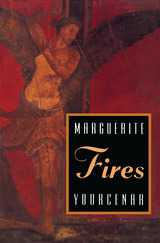5 books by Yourcenar, Marguerite

A Blue Tale and Other Stories
Marguerite Yourcenar
University of Chicago Press, 1995
This story collection is a welcome port of entry for any reader not yet familiar with Marguerite Yourcenar’s works.
Published to great acclaim in France in 1993, this collection is not only a delight for Marguerite Yourcenar fans but a welcome port of entry for any reader not yet familiar with the author's lengthier, more demanding works. This collection includes three stories written between 1927 and 1930 when the author was in her mid-twenties. These stories cover a range of themes, from an allegory on greed and a scene from the war of the sexes to a witch hunt that obsessively creates its own quarry.
For the devoted readers of Yourcenar, this collection allows a rare glimpse at the beginnings of a writer's craft. In these accomplished but forgotten pieces, edited and introduced by her biographer, Josyane Savigneau, readers will find the blend of fable and fairy tale of Oriental Tales, the psychological chronicle of Dear Departed, and the ironic realism of A Coin in Nine Hands. Read as an introduction to Yourcenar's work, the stories take us into the writer's workshop, as it were, to the early days of creation. A Blue Tale and Other Stories carries the unmistakable voice of a formidable and vastly talented writer.
Marguerite Yourcenar (her pseudonym was an anagram of her family name, Crayencour) was born in Brussels in 1903 and died in Maine in 1987. One of the most respected writers in the French language, she is best known as the author of the best-selling Memoirs of Hadrian and The Abyss. She was awarded many literary honors, most notably election to the Académie Francaise in 1980, the first woman to be so honored.
Published to great acclaim in France in 1993, this collection is not only a delight for Marguerite Yourcenar fans but a welcome port of entry for any reader not yet familiar with the author's lengthier, more demanding works. This collection includes three stories written between 1927 and 1930 when the author was in her mid-twenties. These stories cover a range of themes, from an allegory on greed and a scene from the war of the sexes to a witch hunt that obsessively creates its own quarry.
For the devoted readers of Yourcenar, this collection allows a rare glimpse at the beginnings of a writer's craft. In these accomplished but forgotten pieces, edited and introduced by her biographer, Josyane Savigneau, readers will find the blend of fable and fairy tale of Oriental Tales, the psychological chronicle of Dear Departed, and the ironic realism of A Coin in Nine Hands. Read as an introduction to Yourcenar's work, the stories take us into the writer's workshop, as it were, to the early days of creation. A Blue Tale and Other Stories carries the unmistakable voice of a formidable and vastly talented writer.
Marguerite Yourcenar (her pseudonym was an anagram of her family name, Crayencour) was born in Brussels in 1903 and died in Maine in 1987. One of the most respected writers in the French language, she is best known as the author of the best-selling Memoirs of Hadrian and The Abyss. She was awarded many literary honors, most notably election to the Académie Francaise in 1980, the first woman to be so honored.
[more]

A Coin in Nine Hands
A Novel
Marguerite Yourcenar
University of Chicago Press, 1994
During the space of a day in Rome in 1933, a ten-lira coin passes through the hands of nine people—including an aging artist, a prostitute, and a would-be assassin of Mussolini. The coin becomes the symbol of contact between human beings, each lost in private passions and nearly impenetrable solitude.
"A Coin in Nine Hands has . . . passages that move close to poetry and a story that belongs in both literature and history."—Doris Grumbach, Los Angeles Times Book Review
"What lingers at the end of A Coin in Nine Hands is the shadowiness and puppetlike vagueness of the Dictator, and the compelling specificity of the so-called 'common people' revolving all around him."—Anne Tyler, The New Republic
"Within a few pages we have met half the major characters in this haunting, brilliantly constructed novel. . . . The studied perfection, the structural intricacy and brevity remind one of Camus. Yet by comparison, Yourcenar's prose is lavish, emotional and imagistic."—Cynthia King, Houston Post
"Transcends its specific time and place to become a portrait of vividly delineated characters caught in the vise of a tragically familiar political situation."—Publisher's Weekly
Best known as the author of Memoirs of Hadrian and The Abyss, Marguerite Yourcenar (1903-87) achieved countless literary honors and was the first woman ever elected to the Académie Française.
"A Coin in Nine Hands has . . . passages that move close to poetry and a story that belongs in both literature and history."—Doris Grumbach, Los Angeles Times Book Review
"What lingers at the end of A Coin in Nine Hands is the shadowiness and puppetlike vagueness of the Dictator, and the compelling specificity of the so-called 'common people' revolving all around him."—Anne Tyler, The New Republic
"Within a few pages we have met half the major characters in this haunting, brilliantly constructed novel. . . . The studied perfection, the structural intricacy and brevity remind one of Camus. Yet by comparison, Yourcenar's prose is lavish, emotional and imagistic."—Cynthia King, Houston Post
"Transcends its specific time and place to become a portrait of vividly delineated characters caught in the vise of a tragically familiar political situation."—Publisher's Weekly
Best known as the author of Memoirs of Hadrian and The Abyss, Marguerite Yourcenar (1903-87) achieved countless literary honors and was the first woman ever elected to the Académie Française.
[more]

Fires
Marguerite Yourcenar
University of Chicago Press, 1994
Fires consists of nine monologues and narratives based on classical Greek stories. Antigone, Clytemnestra, Phaedo, Sappho are all mythical figures whose stories are mingled with contemporary themes. Interspersed are highly personal narratives, reflecting on a time of profound inner crisis in the author's life.
"The unwritten novel among the fantasies and aphorisms of Fires is a classic tale."—Stephen Koch, New York Times Book Review
"The unwritten novel among the fantasies and aphorisms of Fires is a classic tale."—Stephen Koch, New York Times Book Review
[more]

Mishima
A Vision of the Void
Maguerite Yourcenar
University of Chicago Press, 2001
On November 25, 1970, Japan's most renowned postwar novelist, Yukio Mishima, stunned the world by committing ritual suicide. Here, Marguerite Yourcenar, a brilliant reader of Mishima and a scholar with an eye for the cultural roles of fiction, unravels the author's life and politics: his affection for Western culture, his family and his homosexuality, his brilliant writings, and his carefully premeditated death.
[more]

Two Lives and a Dream
Marguerite Yourcenar
University of Chicago Press, 1994
Set in Rembrandt's Amsterdam, "An Obscure Man" is the story of Nathanaël—innocent, open to experience—born like Everyman upon the stream of life. In "A Lovely Morning," Nathanaël's young son joins a touring company of Jacobean actors. "Anna, soror . . . ," the final tale, is an account of illicit passion in the baroque world of Naples.
"An Obscure Man swarms with life. This intricately researched, imaginative, beautifully written tale of a young man's brief life in the mid-17th century is entirely engrossing."—Leona Weiss, San Francisco Chronicle
"In these three stories, [Yourcenar] succeeds in making the essences of these past lives a part of the reader's future through the sheer intensity of their portrayal."—Margaret Ezell, Houston Chronicle
"An Obscure Man swarms with life. This intricately researched, imaginative, beautifully written tale of a young man's brief life in the mid-17th century is entirely engrossing."—Leona Weiss, San Francisco Chronicle
"In these three stories, [Yourcenar] succeeds in making the essences of these past lives a part of the reader's future through the sheer intensity of their portrayal."—Margaret Ezell, Houston Chronicle
[more]
READERS
Browse our collection.
PUBLISHERS
See BiblioVault's publisher services.
STUDENT SERVICES
Files for college accessibility offices.
UChicago Accessibility Resources
home | accessibility | search | about | contact us
BiblioVault ® 2001 - 2024
The University of Chicago Press









